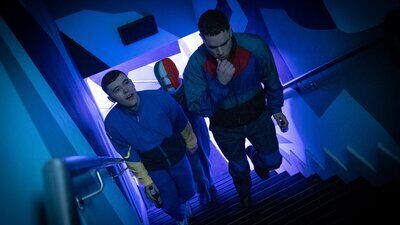Following a neorealist spirit, Peppiatt enlisted the real-life members of Kneecap to play themselves. In it, DJ Próvaí is a music teacher, who, after seeing Liam Óg “Mo Chara” Ó hAnnaidh and Naoise “Móglaí Bap” Ó Cairealláin live, desperately wants to record them. The lads, however, have a few problem: The mother of Liam’s girlfriend, a cop, is determined to shut down their shows, Noise’s mother is lonely and despondent, his father Arlo (Michael Fassbender)—a member of paramilitary organization for independence—has been in hiding from authorities for years. In between rampant partying, scenes of sex, drugs, and rock and roll, the trio of men stand up for the right for their music, their heritage, and their language to exist in an energetic and rambunctious imagining of their origins.
RogerEbert.com spoke with Peppiatt at the Hotel Thermal during the Karlovy Vary International Film Festival to speak about the first time he saw Kneecap, the film’s neorealism, and the impact he hopes the biopic will have on oppressed communities.
This conversation has been edited and condensed for clarity.
You first saw the band play in Belfast back in 2019. What was that experience like?
You know, my favorite band growing up was Rage Against the Machine. And to me, the politics have gone out of music—not completely, there’s always political acts—but Kneecap just really threw me back to that period of a band who’s politics first. They didn’t care about the consequences of the positions they took on things, and they were going to use their platform to sort of press the case for their causes. Kneecap, even back then in 2019, were that. I just love the energy about them. There were a thousand young people there in Belfast watching them even back then, who were just obsessive. They knew every word that they were rapping in a language that I didn’t realize anyone actually spoke really, other than a few farmers out in the countryside.
To me, it was like: Hang on, there’s all these young people who are engaging with a language that I thought was pretty much dead. And there’s something in that story, right? I don’t know what that story is, but we had this political backdrop that there was a big fight to try and get political recognition of the Irish language because despite it being the language of Ireland in the north of Ireland, it wasn’t recognized, which is crazy. It had been erased completely from any official recognition. I just saw this connection between this politically serious battle and these boys on stage throwing drugs into the crowd causing absolute bedlam, but doing it through a language that few people spoke.

